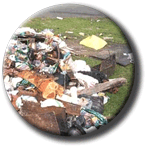Naturenet: Flytipping
Flytipping
F
l y-tipping is the unauthorised dumping of waste. It is something that most
countryside managers have to deal with from time to time, and is particularly
common near urban areas. It costs money to dump rubbish at a licensed tip,
so it is cheaper to throw it out of the back of a van in a lay-by or car park
one evening. It is also a common problem when houses back onto countryside.
People frequently throw rubbish over their own back fences, onto what rapidly
becomes 'waste' land. All of these things are offences, but unfortunately for
the landowner, it is very hard to use the law to do anything about fly-tipping,
assuming you know who did it in the first place.
y-tipping is the unauthorised dumping of waste. It is something that most
countryside managers have to deal with from time to time, and is particularly
common near urban areas. It costs money to dump rubbish at a licensed tip,
so it is cheaper to throw it out of the back of a van in a lay-by or car park
one evening. It is also a common problem when houses back onto countryside.
People frequently throw rubbish over their own back fences, onto what rapidly
becomes 'waste' land. All of these things are offences, but unfortunately for
the landowner, it is very hard to use the law to do anything about fly-tipping,
assuming you know who did it in the first place.
To report flytipping anywhere in England, Scotland and Wales use the gov.uk form.
If you are a private landowner and become a victim of fly-tipping then it is your responsibility to safely dispose of the waste and pay any costs for doing so.
Report the incident to your local authority or the Environment Agency. Although they have no obligation to remove the waste, they may be able to provide guidance on the best way to deal with the removal of the waste.
If you suffer flytipping you - or someone - should be able to answer one of the following
questions with a yes to stand a hope of succeeding in any prosecution:
- Did you personally, or a reliable witness who is willing to testify to
this, see the tipper in action?
- Do you know who the tipper is?
- Is there anything in the waste (e.g. envelopes, packing labels etc) with
identifying detials on it?
Even so, there is not much chance of success with casual flytipping. A far
better bet is when a landowner tips across his own borders, for example a building
site dumping spoil across the fence, or a householder throwing a settee over
the hedge. In this case, especially if you have seen the landowner at it, you
might well have a case. However, in this case you should almost certainly try
the polite approach first, and only go onto prosecutions if this has got you
nowhere.
In the case of garden rubbish, it is usually fairly obvious
who the culprits are, or at least where they probably live. If you represent
the local authority a strongly worded but non-specific note on official
paper dropped by hand to each house within wheelbarrow range can be very
effective, especially when combined with a high-profile local clear-up. Of
course, you can't actually prosecute unless you catch them at it, just like
anything else, but neighbour pressure is a marvellous thing. If it comes
to it, sit out there on a Sunday afternoon behind a bush. You will soon get
plenty of evidence. You should also be aware that some garden waste, such
as grass cuttings, does not fall under the definition of 'controlled waste'
and so although still illegal to tip might be even harder to actually prosecute
over. Much better to be vaguely threatening.
Depending on the nature of the crime flytipping can involve the police, the local council, the Environment
Agency , the landowner, or any or all of these. Initial reports can go to the local authority. Reports to the Environment Agency can be made using their national hotline number 0800 807 060.
, the landowner, or any or all of these. Initial reports can go to the local authority. Reports to the Environment Agency can be made using their national hotline number 0800 807 060.
Upon finding a deposit of fly-tipped
waste you should treat it as potentially dangerous. Anything involving unmarked
containers, solvents, burnt or burning material (especially including vehicles),
is particularly suspect. Burnt vehicles (or the debris left after a burnt vehicle
has been removed) should never be touched without wearing protective gloves
as it may contain highly toxic compounds which can be absorbed through the
skin. Only disturb fly-tipped waste if the waste is obviously harmless, e.g.
grass cuttings.
- Make a note of the constituents of the waste and the quantity.
- Take photographs of the waste.
- Without disturbing it, examine the contents for evidence:
envelopes, letters, business cards, leaflets etc.
- If safe to do so, remove evidence for safe keeping.
- If you have any reason to believe hazardous materials are
present, prevent public access and get advice if necessary.
- Advise the Enforcement Section of the Environment Agency
- Arrange
for disposal of waste.
Upon witnessing a Fly-Tipping incident in progress you should:
- Observe from a distance, noting vehicle description and number plate: colour,
make, type and markings etc.
- Note descriptions of depositors: height, colour, age, hair colour, build
etc.
- Be wary about approaching depositors but if you do try to obtain Name,
Address and name of person who gave permission.
- After depositors have gone make notes as above.
Note: If after being approached the potential depositors clear up their waste and leave, please forward the details to the Environment Agency as it is likely that they will be unregistered waste carriers and will tip elsewhere.

 y-tipping is the unauthorised dumping of waste. It is something that most
countryside managers have to deal with from time to time, and is particularly
common near urban areas. It costs money to dump rubbish at a licensed tip,
so it is cheaper to throw it out of the back of a van in a lay-by or car park
one evening. It is also a common problem when houses back onto countryside.
People frequently throw rubbish over their own back fences, onto what rapidly
becomes 'waste' land. All of these things are offences, but unfortunately for
the landowner, it is very hard to use the law to do anything about fly-tipping,
assuming you know who did it in the first place.
y-tipping is the unauthorised dumping of waste. It is something that most
countryside managers have to deal with from time to time, and is particularly
common near urban areas. It costs money to dump rubbish at a licensed tip,
so it is cheaper to throw it out of the back of a van in a lay-by or car park
one evening. It is also a common problem when houses back onto countryside.
People frequently throw rubbish over their own back fences, onto what rapidly
becomes 'waste' land. All of these things are offences, but unfortunately for
the landowner, it is very hard to use the law to do anything about fly-tipping,
assuming you know who did it in the first place.